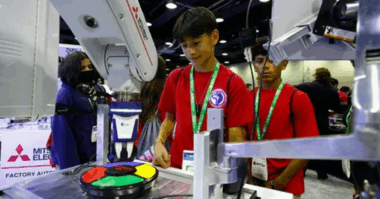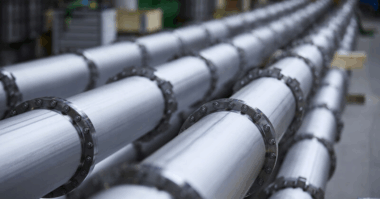A new dawn is fast approaching where data and technology innovation is on the cusp of changing our commercial and personal lives.
Computing power and the data it generates is growing exponentially. Next year we will see vast developments. In a decade from now new companies and companies we already know will have global reputations established through data analytics businesses. This unprecedented growth in data will result from an ‘Internet of Things’ that will monitor and measure our machines, our businesses, our environment and us.
Big data will be everywhere – large volumes of different types of data moving at speed through a digital ecosystem. To compete in this new landscape, companies at this year’s OTC Houston 2017 must learn to master big data, or they will find themselves out thought, out flanked and out dated.
“The new scale of data availability will change all the strategic sectors that we support,” says Professor Richard Clegg, Foundation Chief Executive, Lloyd’s Register (LR) Foundation. “They will be changed because data will feature in all aspects of the business life-cycle; from design to manufacturing, maintenance to decommissioning. Data will be used to predict and anticipate, plan and decide every aspect of the 21st century workplace.”
The LR Foundation published its Foresight Review of Big Data (http://www.lrfoundation.org.uk/publications) which describes technical, organisational, social, and legal implications of living in a world of data.
Perspectives on big data
Alasdair Buchanan, Director of the Energy business of LR says: “There are many perspectives on big data that need to be appreciated by those seeking to innovate responsibly, and not just in the energy and marine offshore sectors. Big data is an asset and needs to be understood within the total value chain of an organisation. It imposes demands on infrastructure and on humans.”
The digital oil field
Energy companies are increasingly integrating data and other asset information to improve workflow management, visualisation, monitoring, control, analytics and communications of their operations. Large seismic data sets, combined with powerful pattern recognition and rapid analysis, support exploration. Drilling data is streamed in real-time from the drill string and surface equipment throughout the drilling of a well.
“We’re seeing a gradual shift by industry to increasingly look at real-time analytics to improve safety and efficiency, avoid equipment failures and provide geological information for critical decision support,” highlights Buchanan.
“Data standards, generation, capture, annotation, storage, analysis, visualisation, security and ownership will increasingly become key parts of the modern engineering life cycle, significantly changing how design, manufacturing, maintenance and decommissioning of complex infrastructure and other assets will be carried out in the future.”
Also, Buchanan emphasises that advanced tagging technologies and smart materials will turn machines and vessels into smart products with memories of each part’s production and operation history. “There will be a move away from fixed maintenance intervals, towards tailored predictive maintenance, reducing operator risk and providing better cost-efficiencies for industry,” says Buchanan.
Data-enabled workers
LR points out that further development and broader distribution of wearable sensors, smart watches and even smart glasses will impact how we live privately and how we work professionally, turning us into ‘data-enabled prosumers’. “Sensing vital signs could increase worker security and well-being by decreasing the risk of critical failures due to fatigue or illness,” says Buchanan.
Shaping the future. Delivering solutions today
“Big data, in an engineering-related context, is going to bridge the gap from being able to monitor ‘what is’ to predicting ‘what if’ in near real-time, creating value through potential enhancements in safety, reliability and performance of energy assets and infrastructure,” highlights Buchanan.
“We are working with industry to build global software solutions that create value for our customers and we have used this year’s OTC 2017 in Houston to promote insight in to some of the work we are doing in this area. We’re bringing together all of LR’s existing commercial software activities and have acquired new software and technology companies to provide a suite of integrated data and digital solutions including remote presence inspections, cyber security, AM and asset lifecycle management to further support America’s offshore and onshore activity.”
“It is a fast evolving technological environment, which provides huge challenges for those seeking to assure safety. Big data and advanced analytical tools will address these challenges,” says Buchanan.
About Lloyd’s Register
Lloyd’s Register (LR) is a global engineering, technical and business services organisation wholly owned by the Lloyd’s Register Foundation, a UK charity dedicated to research and education in science and engineering. Founded in 1760 as a marine classification society, LR now operates across many energy industry sectors, with around 9,000 employees in the Group across 78 countries.
LR has a long-standing reputation for integrity, impartiality and technical excellence. Our compliance, risk and technical consultancy services give clients confidence that their assets and businesses are safe, sustainable and dependable. Through our global technology centres and research network, LR is at the forefront of understanding the application of new science and technology to future-proof our clients’ businesses.
About the Lloyd’s Register Foundation
The Lloyd’s Register Foundation: Connecting science, safety and society
The Lloyd’s Register Foundation is a UK charity, established in 2012, which funds the advancement of engineering-related education and research and supports work that enhances safety of life and property. It is funded partly by the profits of its trading arm, Lloyd’s Register Group Limited, a global engineering, technical and business services organisation.
Its vision is to be known worldwide as a leading supporter of engineering-related research, training and education that makes a real difference in improving the safety of the critical infrastructure on which modern society relies. In support of this, it promotes scientific excellence and acts as a catalyst working with others to achieve maximum impact.
The Lloyd’s Register Foundation’s strategy for 2014-2020 focuses funding on four strategic themes: promoting safety and public understanding of risk; advancing skills and education; supporting excellent scientific research; and accelerating the application of research. Four research themes have been prioritised: structural integrity and systems performance; resilience engineering; human and social factors; and emergent technologies. See more at: www.lrfoundation.org.uk/strategy




